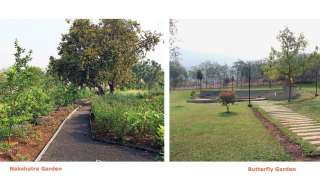MEDIA
Towards a greener future
www.sakaltimes.com | October 3, 2018
Lavale valley, situated in the Western Ghats, houses the bustling FLAME University campus. The valley also has a favourable environment for the flourishing biodiversity. Which is why, the university today is host to several species of organisms, including plants, animals and other forms of life. The Flame campus comprises a Medicinal Plant Garden, a Nakshatra Garden, a Butterfly Garden and has an area demarcated for organic farming.
Ravindar Kolekar, a graduate from Maharaja Sayajirao University, Baroda, has been working towards the preservation and management of medicinal plants since the past few years and is in-charge of the conservation project at Flame University. He discusses the initiative at length.
Medicinal Plant Garden
Today, the market is filled with allopathic medicines, which contain chemicals resulting in multiple side-effects. Ayurvedic remedies contain medicinal plants such as herbs and shrubs restoring the body back to balance. Unfortunately, the lack of knowledge about the variety of medicinal plants today has made their identification virtually impossible even by ayurvedic practitioners. So there’s a need to spread awareness.
There’s also a pressing need to conserve medicinal plants because privatisation of the health sector has led big pharmaceutical companies to collect medicinal plants from the forests for the production of their chemical-based medicines and deplete the forests of their rich resources. The absence of accountability and social responsibility in the health sector has contributed largely to the endangerment of medicinal plants resulting in the adulteration of medicines. Flame University has taken the initiative to work towards the conservation of rare species of medicinal plants.
The Medicinal Plant Garden has been on campus for four years now. The management spends over Rs 300,000 per annum for the maintenance of the garden. Besides, the management also provided preliminary support by bearing the cost of architecture and engineering in setting up the garden.
The garden constitutes over a hundred species of medicinal plants including shrubs, herbs, trees, climbers and ground creepers. These species, usually found in the wild, are multiplied and prepared into saplings at the nursery which are then planted in the garden for re-generation.
Nakshatra Garden
The Nakshatra Garden is located around the amphitheatre adjacent to one of the academic buildings on campus. The concept of the Nakshatra Garden is rooted in the Indian traditional values surrounding the conservation of forests. Planting nakshatra trees lead to a natural revivification of forests. There are 27 nakshatra trees based on the Vedic zodiac stars and the position of each tree is pre-determined by the ancient saints. Furthermore, these trees have high medicinal properties ensuring physical, psychological and spiritual well-being.
To conserve forests in Maharashtra, the concept of devrai has been introduced. Each village in the state has a natural reserve in the adjoining area. The reserve has a temple with an idol of a goddess worshipped widely by the village community. It is believed that inflicting destruction on the reserve would anger the goddess leading to ruination of the village. This strategy has been quite successful in conserving forests across the state.
Butterfly Garden
The Butterfly Garden was set up two years ago to preserve and protect butterflies. Many species of butterflies are becoming less abundant as a result of habitat destruction and fragmentation. In addition, lack of availability of preferred plants for nectar has led to a further loss of butterfly species. Flame University has been able to provide a favourable environment for the conservation of butterflies.
The garden has a mud pond and over 50 butterfly attracting plants such as sunflowers, marigolds, poppies, lilies, daisies, and others. The team has documented caterpillars, egg-droppings and newer species of butterflies usually found in the months of November and December.
Organic Farming
Flame University started organic farming with students’ involvement four years ago. The small organic farm is located behind Balu tapri. Natural manure and compost is used in farming to provide the crops with micronutrients such as nitrogen and potassium. Crops produced organically include rice, fenugreek, spinach, coriander, tomatoes, eggplant, nutmeg, lady’s finger and beans. The produce is sold to students, staff members, faculty and visitors. The income from the sale is utilised in the further development of conservation activities on campus. Organic farming is a great experience for students as they discover the benefits of organic produce and also learn farming methods for subsistence.
To increase the demand for organic produce, there is a need to train and motivate farmers. They need to be protected by the state machinery to enable them to cultivate crops organically. This would require transforming the agricultural system through the major involvement of government agencies.
(Source: http://www.sakaltimes.com/art-culture/towards-greener-future-25744)

